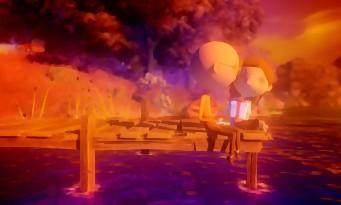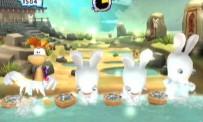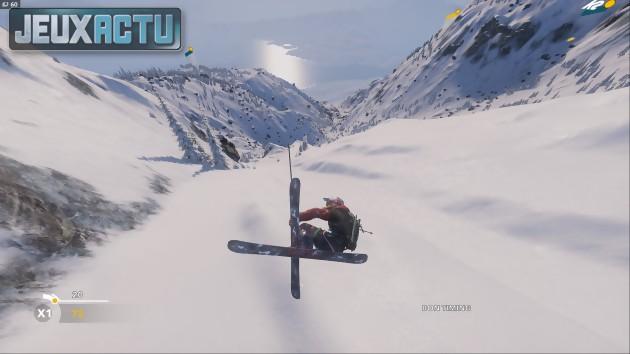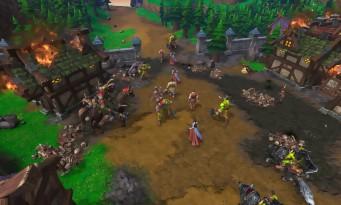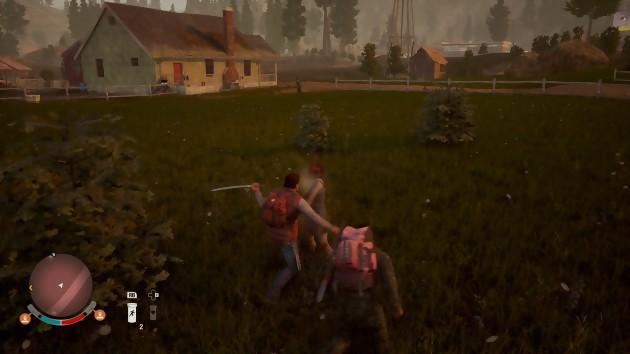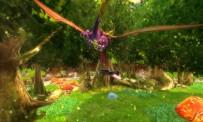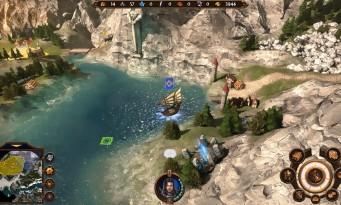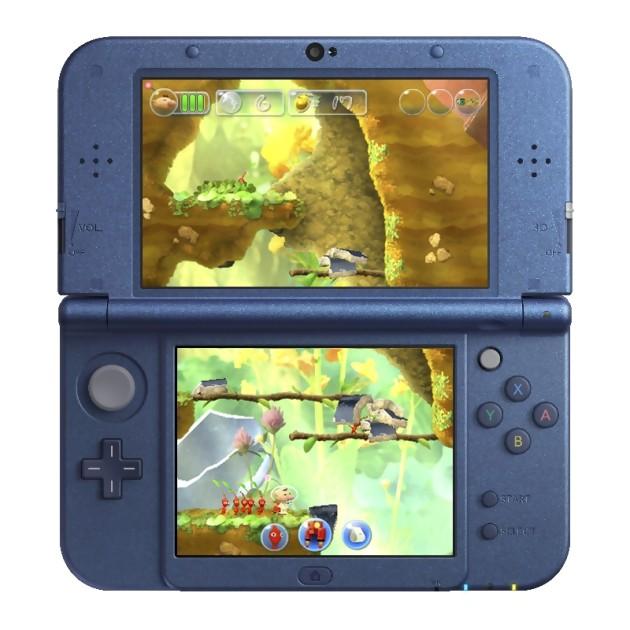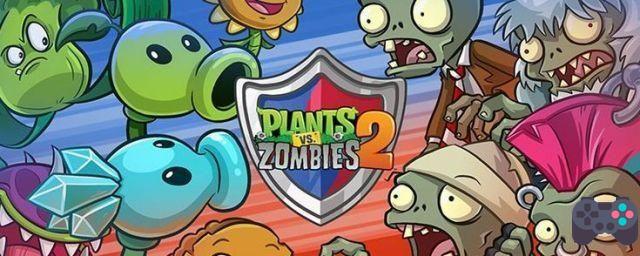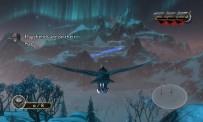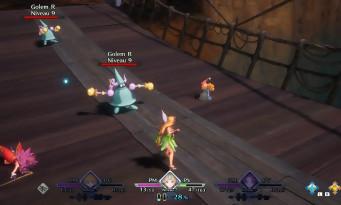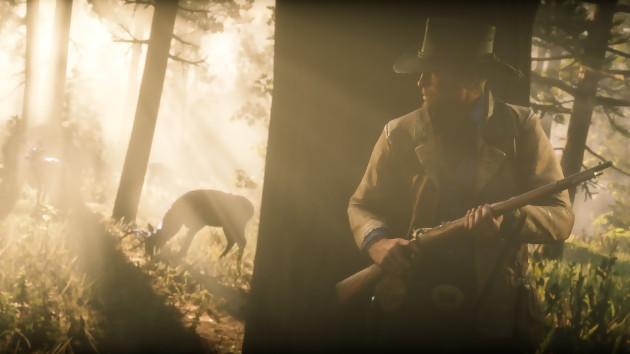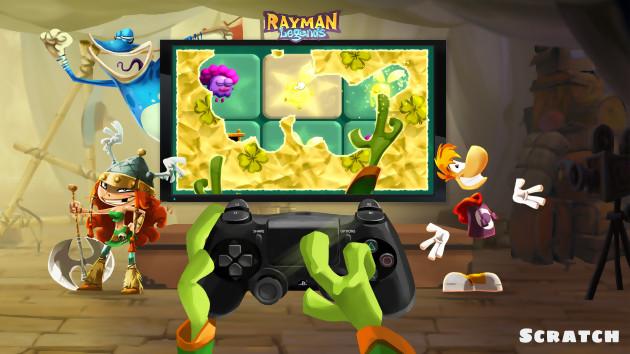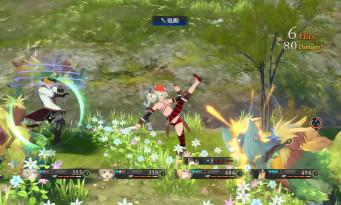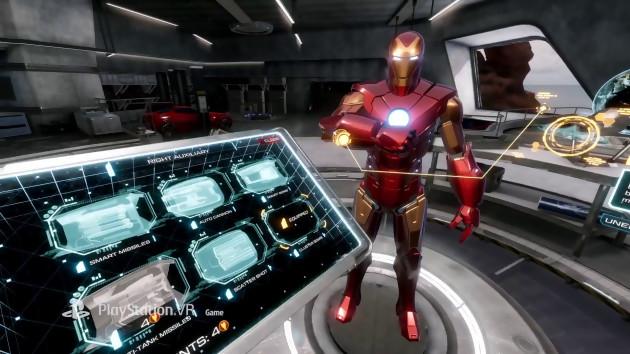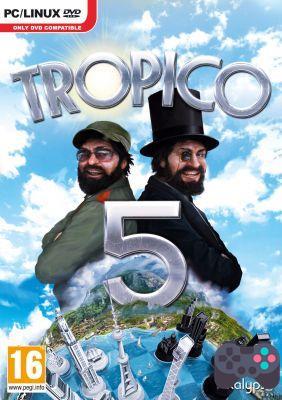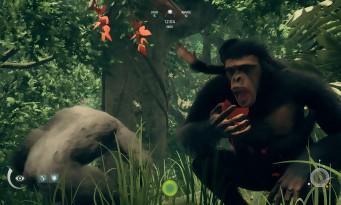 The adventure begins in Africa, ten million years before our era. A great ape succumbs to the beaks of a giant eagle, and its offspring finds itself alone, frightened and totally lost. The player is not far from being in the same state, because even if this sequence acts as a tutorial, it remains like all the rest of the game: deliberately poor in indications. Here is a creed totally assumed by the developers, who gratify us in the introduction of the following message: "good luck, we will not provide you with much help". And that is an understatement! The intention of the studio is rather laudable, since it is basically about letting the player grope around in order to simulate the experience lived by our great ancestors a long time ago. It works well when our curiosity and many trials lead us to discover how to build a bed, stop bleeding, cure food poisoning, or turn a dead branch into a sharp stick, for example. We then feel the pleasure of having made an important discovery by ourselves.
The adventure begins in Africa, ten million years before our era. A great ape succumbs to the beaks of a giant eagle, and its offspring finds itself alone, frightened and totally lost. The player is not far from being in the same state, because even if this sequence acts as a tutorial, it remains like all the rest of the game: deliberately poor in indications. Here is a creed totally assumed by the developers, who gratify us in the introduction of the following message: "good luck, we will not provide you with much help". And that is an understatement! The intention of the studio is rather laudable, since it is basically about letting the player grope around in order to simulate the experience lived by our great ancestors a long time ago. It works well when our curiosity and many trials lead us to discover how to build a bed, stop bleeding, cure food poisoning, or turn a dead branch into a sharp stick, for example. We then feel the pleasure of having made an important discovery by ourselves.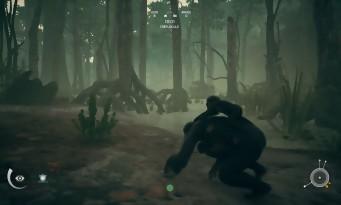 The problem is that the lack of indications extends even to the extradiegetic elements. Understand by this that the game will never explain to you that you have to trigger certain commands according to sounds that are far too discreet for you to pay attention to them spontaneously, nor what this interface element at the bottom right which looks like a mini-map but which is not one (the game is also devoid of a map, which is totally consistent with the fact of playing primitive beings). To top it off, the controls are relatively confusing, since the same button can correspond to different actions depending on the moment and the context. In addition, some actions are triggered in the classic way when a button is pressed, while others are triggered by the release of the command. Suffice to say that during the first hours we have more the impression of fighting against the game rather than against the hostile nature, and that many downtimes are inserted between our various discoveries.
The problem is that the lack of indications extends even to the extradiegetic elements. Understand by this that the game will never explain to you that you have to trigger certain commands according to sounds that are far too discreet for you to pay attention to them spontaneously, nor what this interface element at the bottom right which looks like a mini-map but which is not one (the game is also devoid of a map, which is totally consistent with the fact of playing primitive beings). To top it off, the controls are relatively confusing, since the same button can correspond to different actions depending on the moment and the context. In addition, some actions are triggered in the classic way when a button is pressed, while others are triggered by the release of the command. Suffice to say that during the first hours we have more the impression of fighting against the game rather than against the hostile nature, and that many downtimes are inserted between our various discoveries.
RAAAHAA!
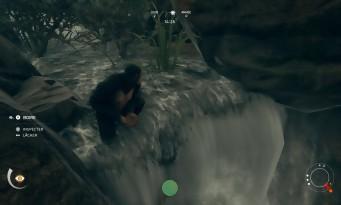 Since the game unpacks all its faults at the start of the adventure and only reveals its qualities later, let's follow the same path and immediately raise the issue of production, which can be greatly improved. At first, you will hate the saber-toothed tigers, which you will not be able to defeat like the first Rahan to come. On the one hand because of an abusive and artificial spawning system, but also because of the sound QTEs which silence their existence as mentioned above, and also because of a camera which suddenly changes angle and complicates maneuvers avoidance, which are nevertheless essential. Similarly, you will regularly fall during your first walks on the treetops, due to distances that are difficult to assess and a poorly explained attachment system. We can also notice the presence of sometimes embarrassing bugs (a corpse that hangs vertically on a trunk and that we cannot identify, or even a monkey that finds itself suddenly teleported to the top of a tree with a totally disturbed z axis …). Also, without being totally unsightly, the graphics don't really flatter the retina and already look dated. That again, we can forgive it from a small indie studio that doesn't necessarily have hundreds of people at its beck and call. On the other hand, it is more surprising, and perhaps even more regrettable, that certain interface elements have not been more cared for. The icons that are displayed superimposed on the environment thus take the form of simple squares, circles, triangles and whitish diamonds, which disagree unpleasantly with the prehistoric universe and the organic aspect of the decorations. Admit in the end that from a technical and aesthetic point of view, there is something to grumble about!
Since the game unpacks all its faults at the start of the adventure and only reveals its qualities later, let's follow the same path and immediately raise the issue of production, which can be greatly improved. At first, you will hate the saber-toothed tigers, which you will not be able to defeat like the first Rahan to come. On the one hand because of an abusive and artificial spawning system, but also because of the sound QTEs which silence their existence as mentioned above, and also because of a camera which suddenly changes angle and complicates maneuvers avoidance, which are nevertheless essential. Similarly, you will regularly fall during your first walks on the treetops, due to distances that are difficult to assess and a poorly explained attachment system. We can also notice the presence of sometimes embarrassing bugs (a corpse that hangs vertically on a trunk and that we cannot identify, or even a monkey that finds itself suddenly teleported to the top of a tree with a totally disturbed z axis …). Also, without being totally unsightly, the graphics don't really flatter the retina and already look dated. That again, we can forgive it from a small indie studio that doesn't necessarily have hundreds of people at its beck and call. On the other hand, it is more surprising, and perhaps even more regrettable, that certain interface elements have not been more cared for. The icons that are displayed superimposed on the environment thus take the form of simple squares, circles, triangles and whitish diamonds, which disagree unpleasantly with the prehistoric universe and the organic aspect of the decorations. Admit in the end that from a technical and aesthetic point of view, there is something to grumble about!
THE ODYSSEY OF THE SPECIES
 Well, mass is said then? Ancestors, it's all rotten and we can move on? Nay, my good friend! By offering us to take in hand the destiny of our ancestors from less than ten million years to less than two million years, Ancestors offers us a great feeling of freedom, very immersive phases of exploration, the feeling of playing something something really new, and the pleasure of developing our primates in the short term as well as in the very long term. The gameplay loop is based primarily on observing the environment, which is only possible by standing still. The control dedicated to the senses then makes it possible to display visual representations of the sounds and smells around on the screen, and therefore to precisely identify certain dangers or certain resources. Even more importantly, intelligence displays icons on the screen to identify, or even memorize, certain objects and places. Communication with other members of our clan (which we can all embody at leisure) is also important. You can call them, groom them to create bonds, or encourage them to stand up for a few moments, which prefigures the posture that the most advanced hominids will adopt at the end of the game. Survival obliges, it is also necessary to take care to eat, drink and sleep enough, under penalty of seeing our avatar of the moment wither. In addition, inspecting unknown objects unlocks additional actions; and you end up being able to alter certain elements and make very useful tools. Naturally, the game never gives you any recipes in advance. It is up to you to test different possibilities. Exploration, on the other hand, uses a "fear of the unknown" system, which almost makes the screen go black and white, blurs the view and displays disturbing visions of predators everywhere. To overcome our fear, it is then imperative to use our senses and our intelligence to identify as many elements as possible, then follow a large white ball supposed to symbolize who knows what (another interface element which cuts incongruously with the game environment…). This done, a new area of the open world is unlocked and the clan can eventually move in the area.
Well, mass is said then? Ancestors, it's all rotten and we can move on? Nay, my good friend! By offering us to take in hand the destiny of our ancestors from less than ten million years to less than two million years, Ancestors offers us a great feeling of freedom, very immersive phases of exploration, the feeling of playing something something really new, and the pleasure of developing our primates in the short term as well as in the very long term. The gameplay loop is based primarily on observing the environment, which is only possible by standing still. The control dedicated to the senses then makes it possible to display visual representations of the sounds and smells around on the screen, and therefore to precisely identify certain dangers or certain resources. Even more importantly, intelligence displays icons on the screen to identify, or even memorize, certain objects and places. Communication with other members of our clan (which we can all embody at leisure) is also important. You can call them, groom them to create bonds, or encourage them to stand up for a few moments, which prefigures the posture that the most advanced hominids will adopt at the end of the game. Survival obliges, it is also necessary to take care to eat, drink and sleep enough, under penalty of seeing our avatar of the moment wither. In addition, inspecting unknown objects unlocks additional actions; and you end up being able to alter certain elements and make very useful tools. Naturally, the game never gives you any recipes in advance. It is up to you to test different possibilities. Exploration, on the other hand, uses a "fear of the unknown" system, which almost makes the screen go black and white, blurs the view and displays disturbing visions of predators everywhere. To overcome our fear, it is then imperative to use our senses and our intelligence to identify as many elements as possible, then follow a large white ball supposed to symbolize who knows what (another interface element which cuts incongruously with the game environment…). This done, a new area of the open world is unlocked and the clan can eventually move in the area.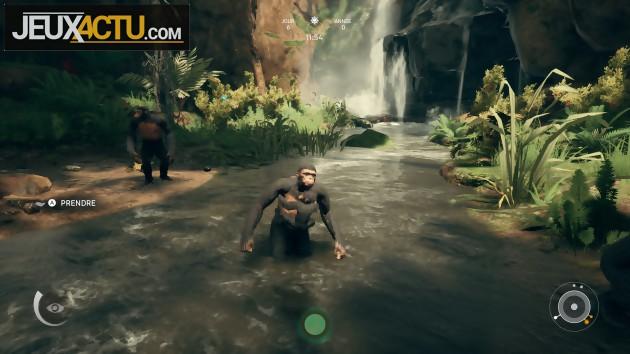
MONKEY SEE, MONKEY DO
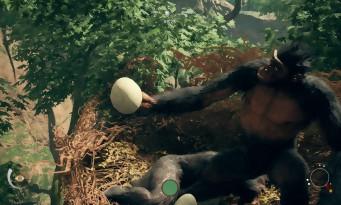 All the actions that you can perform and unlock would be totally useless if it were not possible to pass on your knowledge to future generations. For this, the best is still to carry around permanently with one or two toddlers clinging to our fur (even if it means taking the risk of losing them if we succumb). This generates neural energy, which can then be spent during sleep phases to unlock new abilities. The skill tree therefore takes the elegant and coherent form of a neural network. Each node is unlocked spontaneously according to the actions that one performs naturally in the world. For example, the fact of ingesting poisoned food gives access to a capacity of resistance to poisoning. But for the unlocked nodes to remain acquired for the next generation, they must be "validated" by spending reinforcement points... which correspond to the number of children appearing in the clan. Add to that the spontaneous appearance in some newborns of genetic mutations giving access to additional capacities, and you will quickly understand that it is essential to procreate as much as possible, even if it means inseminating several females at the same time. Prudent in the extreme (monkeys don't have any visible genitals), the camera moves away discreetly during matings. The transition from one generation to another is done manually and triggers a jump in time of fifteen years. Old people die, adults grow old and infertile, while toddlers grow into adulthood.
All the actions that you can perform and unlock would be totally useless if it were not possible to pass on your knowledge to future generations. For this, the best is still to carry around permanently with one or two toddlers clinging to our fur (even if it means taking the risk of losing them if we succumb). This generates neural energy, which can then be spent during sleep phases to unlock new abilities. The skill tree therefore takes the elegant and coherent form of a neural network. Each node is unlocked spontaneously according to the actions that one performs naturally in the world. For example, the fact of ingesting poisoned food gives access to a capacity of resistance to poisoning. But for the unlocked nodes to remain acquired for the next generation, they must be "validated" by spending reinforcement points... which correspond to the number of children appearing in the clan. Add to that the spontaneous appearance in some newborns of genetic mutations giving access to additional capacities, and you will quickly understand that it is essential to procreate as much as possible, even if it means inseminating several females at the same time. Prudent in the extreme (monkeys don't have any visible genitals), the camera moves away discreetly during matings. The transition from one generation to another is done manually and triggers a jump in time of fifteen years. Old people die, adults grow old and infertile, while toddlers grow into adulthood.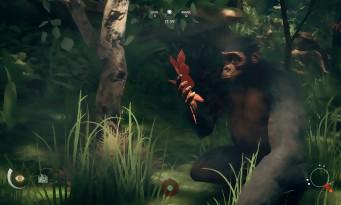 But the real object of the game is to evolve our lineage faster than that of our real-life ancestors. To do this, you can manually and freely trigger (under certain hardly restrictive conditions) the Evolution process. This time the leap in time is gigantic since it amounts to hundreds of thousands, even millions of years. The exact amount is calculated automatically by the game according to the exploits achieved, the progress compared to the actual scientific estimates, as well as the number of births (small bonus of years for each baby) and deaths (significant penalty). We then discover another place, sometimes even another biome, and a new clan that we will have to evolve in turn. The feeling of accomplishing something important is there, and seeing our protégés use the standing position more and more often and for a long time would almost cause pride. Be careful though, the game is ruthless and will not hesitate to make you lose all your progress if ever your lineage dies out following bad choices or too many bad encounters. Moreover, to tame the intransigence (but also the awkwardness in terms of accessibility) of Ancestors, the best is still to carry out a few test runs "in pure loss" before starting a real game that we final wishes. Because the journey we are embarking on is very long. In real time it is fortunately not measured in millions of years, but in about fifty hours all the same. The repetitiveness is inevitably required, but the impression of mastering the game better and better brings a certain satisfaction. If you are not afraid to take on an arid and sometimes a little wonky adventure, you will ultimately have the pleasure of living a relatively extraordinary playful experience!
But the real object of the game is to evolve our lineage faster than that of our real-life ancestors. To do this, you can manually and freely trigger (under certain hardly restrictive conditions) the Evolution process. This time the leap in time is gigantic since it amounts to hundreds of thousands, even millions of years. The exact amount is calculated automatically by the game according to the exploits achieved, the progress compared to the actual scientific estimates, as well as the number of births (small bonus of years for each baby) and deaths (significant penalty). We then discover another place, sometimes even another biome, and a new clan that we will have to evolve in turn. The feeling of accomplishing something important is there, and seeing our protégés use the standing position more and more often and for a long time would almost cause pride. Be careful though, the game is ruthless and will not hesitate to make you lose all your progress if ever your lineage dies out following bad choices or too many bad encounters. Moreover, to tame the intransigence (but also the awkwardness in terms of accessibility) of Ancestors, the best is still to carry out a few test runs "in pure loss" before starting a real game that we final wishes. Because the journey we are embarking on is very long. In real time it is fortunately not measured in millions of years, but in about fifty hours all the same. The repetitiveness is inevitably required, but the impression of mastering the game better and better brings a certain satisfaction. If you are not afraid to take on an arid and sometimes a little wonky adventure, you will ultimately have the pleasure of living a relatively extraordinary playful experience!





